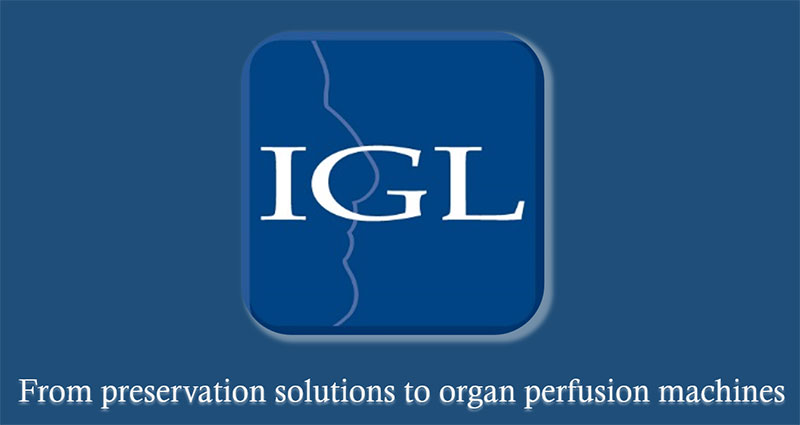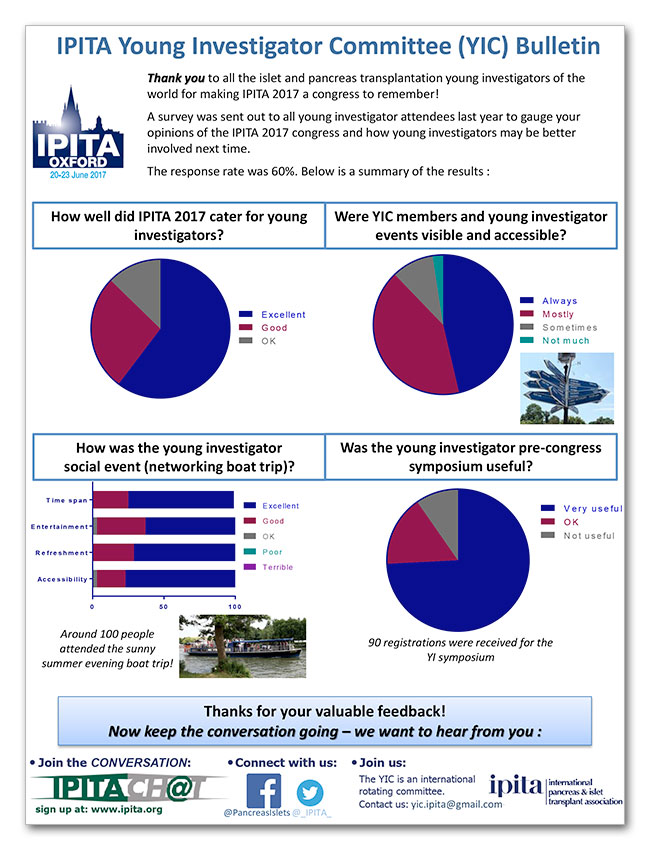IPITA Young Investigator Committee (YIC) Bulletin 2019

With the end of a great summer (for those in the northern hemisphere!) the IPITA-YIC reflects on the past-congress. Here we will summarise the highlights of the congress and present your feedback from the entrance survey. We thank everyone for attending the young investigator run events and making them interactive and enjoyable.
NOTICE BOARD
-
Call for new member’s applications to join the IPITA YIC are open now thru October 21st 2019.
– See below for more information or refer to our Social media accounts and website -
Stay tuned for IPITA YIC end-of-year survey 2019 (please respond – we want to hear from you!)
STAY CONNECTED
on Facebook (page & group), Twitter and Instagram

Figure 1. Word cloud outlining IPITA young investigators hopes for the IPITA 2019 congress, collected from the incoming IPITA YIC survey.
The IPITA YIC hopes that you achieved what you were looking to most take away from the congress (Figure 1). If not, tell us more and send us your suggestions and comments.
IPITA-YIC would like to extend our deepest appreciation and thanks to:
- Xavier Martin (Congress chair),
- Thierry Berney and Olivier Thaunat (Chairs of Scientific Programme Committee),
- Young Investigator Programme Committee: Julien Branchereau, Mikael Chetboun, Alice Koenig, Xavier Matillon & Sarah Cross,
- IPITA Council.
For making the YIC programme a success!
YIC PRECONGRESS WORKSHOP
The IPITA 2019 congress started with a bang with the IPITA YIC precongress workshop, divided into 3 parallel streams. http://www.ipita2019.org/young-investigators.
Stream 1 – Clinical cases in pancreas procurement
This session utilised the SIMLIFE system, where a whole cadaver is perfused with fluid under pulsatile pressure to give the illusion of a living tissue that bleeds a coloured medium, perfect for practicing retrieval techniques and scenarios.

Figure 2. Hands-on-training for IPITA YIs.
Stream 2 – Simulation of islet infusion and complications
The local Young Investigator team hosted an interactive session using the latest SimMan technology at the Lyonnais Center for Education through Simulation in Health (CLESS) at the University Claude Bernard. These simulations allow an active engagement with complication management in real-life scenario with focus on diabetic patients. The attendees had to actively face problems during a transfusion of islets, a stroke and heart attack by making responsible lifesaving decisions. Followed up with a detailed debriefing, focussed on optimal training by the excellent SimMan team made for a unique and outstanding experience.

Figure 3. IPITA YIs were presented with many clinical challenges, simulated using SimMan technology.
Stream 3 – Discussions in cutting edge advances in islet and pancreas transplantation
Featured a half day lecture series followed by small group discussions with an international group of IPITA research experts who generously donated their time. We were honoured to hear from, Professors Shane Grey (Australia), Paolo Monti (Italy), Qizhi Tang (USA), Hanne Scholz (Norway), Ekaterine Berishvili (Georgia), Giuseppe Orlando (USA), Titus Augustine (UK), Jonathan Fridell (USA) and young investigator Simona Chera (Norway). Topics included: Allo- and autoimmunity, Bioengineering and alternative sources for pancreatic beta-cell replacement and Clinical pancreas transplantation.

Figure 4. Packed house at the IPITA YIC Precongress Stream 3 ‘Discussions in cutting edge advances in islet and pancreas transplantation’.
IPITA Science Pub - #IPITASciPub
The #IPITASciPub evenings were an opportunity for trainees/ trainers, juniors/ seniors, mentees/ mentors to have an opportunity to meet in an informal setting with some drinks and snacks and discuss pertinent topics related to islet and pancreas transplantation. Key-note speakers of the day were invited each evening and they facilitated discussion and debate between the young and old(er) investigators.

Figure 5 #IPITASciPub. Top panel, Raja Kandaswamy, Klearchos Papas and Andrew Sutherland talk about pancreas preservation and islet isolation with young investigators during day 1 of IPITA SciPub. Bottom panel, Danwei Huangfu, Haval Shirwan, Christina Nostro, Eckhard Wolf and Eelco de Koning discussing stem cells and future technologies with an eager crowd on the second day.
During the first evening Raja Kandaswamy, Klearchos Papas and Andrew Sutherland discussed the topic “Pancreas preservation for transplantation and islet isolation”. The evening generated some interesting debate and several points for reflection.
The second evening was dedicated to the question “Are stem cells and bioengineering the future of islet and pancreas transplantation?” addressed by Danwei Huangfu, Haval Shirwan, Cristina Nostro, Eckhard Wolf and Eelco de Koning. Again this generated some lively debate aboutethical questions as well as highlighting some of the many challenges in translating laboratory medicine to the clinical environment.
This style of event was the first of its kind at an international conference and was attended by well over 100 Young Investigators and a number of senior clinicians and scientists. It provided a unique opportunity for people from various interests, specialties and backgrounds to discuss and debate some of the ground-breaking research in these fields. Given the overwhelmingly positive feedback following the event, the YIC will continue to innovate and provide forums for multi-disciplinary discussion and debate at future IPITA congresses.
DINOSAUR CHALLENGE
In this deliberately thought-provoking debate, young investigator 'cavemen' had the impossible task of challenging the wise yet ferocious 'dinosaurs' on a number of IPITA research areas, of which the dinosaurs have long been apex predators. This outstanding session led to heated debates between generations! During this successful exchange cavemen and dinosaurs first debated on immunological tolerance; cavemen and dinosaurs discussed advances in immunosuppressive drugs and explored why the Holy Grail – ‘immunosuppression free and antigen-specific tolerance’ has yet to be achieved despite giant leaps in the understanding of immune function and mechanisms.

Figure 6. Top left, Dinosaurs Prof. Shane Grey and Qizhi Tang sit ferociously, intimidating the cavemen (top right panel). Bottom: Team spirit between the Pancreas transplant cavemen and dinosaurs.
In the second debate, cavemen called dinosaurs butchers for doing pancreas transplants! Heated and hilarious exchanges occurred on the achievements and the future of pancreas transplantation that remains the gold-standard treatment for patients with complicated insulin dependent diabetes mellitus, despite lowering numbers in the recent years.
In the third debate, cavemen stated that “Islet transplantation will be extinct, like dinosaurs, before its full potential is realized!”. The discussion revolved around the fact that only a small minority of patients is eligible for islet transplantation and how current and future advances may hold the key to unlocking islets true potential by enabling β-cell replacement therapy for all people with T1DM.
Morning runs through Lyon
Since its inauguration in Monterey 2013 by Peter Stock, the daily morning run has become a valued tradition and provides an opportunity to shake out your legs before starting a long conference day, and meeting fellow conference attendees in a fun and friendly atmosphere. The runners enjoyed the beautiful sights of Lyon as local YI, Julien Branchereau led the group on different scenic routes.

Figure 7. Healthy body, healthy mind! Energetic IPITA members starting the day with a running tour of Lyon!
PITCH SESSION
The Scientific Program Committee and YIC did away with posters in 2019!! It was replaced by a first of its kind ‘PITCH session’, aiming to get your work and take-home-message heard by a broader audience. Speakers were asked to present their abstract as an “elevator pitch” - to convince a panel why their idea or project should be funded for further research, translated to the clinic, adopted into clinical practice, or what makes their findings novel and exciting.

Figure 8. Young Investigator finalists presented their prizes with YIC co-chair Nathan Zammit, councillor Hanne Scholz, and president Thierry Berney.
To top it off, the stakes were raised with cash prizes waiting for the finalists! Two winners from each of the 4 PITCH sessions with the highest panel scores were selected to move to a final session on the last day of the congress. Here these 8 highest scorers from 37 abstracts extended their 1 min pitch to a 5-minute talk and competed for the following prizes: $1000 USD for 1st, $300 USD for 2nd, $200 USD for 3rd and $100 USD for runner ups. Winners were selected by the audience (50% of score) and a panel of judges (50% of score).
Our congratulations go out to - C Ward (1st place), T Robert (2nd place), C Wassmer (3rd place), and runners up: A Surowiecka-Pastewka, S Shaikh, MF Desentis, T Prudhomme and I Shapey.
We will be surveying your opinions of this new style of ‘brief communication’ in our upcoming end-of-year survey.
NETWORKING EVENT
The young investigators networked with peers and professors on the river Saône! Here the results of the IPITA YIC pre-congress survey were announced (below), and the winner of the YIC Survey prize picked from a hat!
Figure 9. Young investigator networking event.

| Sponsors of IPITA young investigator program – IPITA 2019 | YIC networking cruise on River Saône | Winners are grinners! YIC Survey Prize |
Survey results
Before IPITA2019 in Lyon we asked you to fill in a survey for us, which allowed us to get to know you a bit better!
- Turns out that 93% consider themselves a Young Investigator being either a postdoc (first postdoc: 26%, second and third postdoc 10%), a medical registrar (15%) or medical consultant (22%).
- Most of you attended IPITA for education (56%), presenting your research (73%) or networking (27%), but also wine, cheese and meeting friends (15%) were a good reason to join.
- Short talks (66%) and poster (26%) presentation were favoured over PITCHes (7%). In the post-IPITA survey we will ask this question again to see whether PITCHes gained more fame!
- “Where do you see the future of IPITA science?” answered 52% with stem cells, 33% with islet/pancreas transplantation and 7% with xenotransplantation.
- 63% of the voters use social media and 96% like to be updated/get involved in the YIC activities. Luckily, there is a call for 4 new members in the Young Investigator Committee. So we expect your application before Oct 21st! – See below!
Young Investigator Program Sponsor
| IPITA-YIC wishes to thank and acknowledge the support given by IGL, which facilitated the success of the IPITA-YIC program! |
|
|
IPITA-YIC also thanks Xavier Martin and the SAMSEI project (Strategies for Learning Health Professions in Immersive Environment) for their support and devotion to improve education in the medical field. |
We are recruiting 4 new members!

WHO SHOULD APPLY:
- Anyone with an interest in the field of islet and pancreas transplantation
- Self-motivated and ambitious
- Physicians, Surgeons and Scientists in early stages of their career
- Up to 10 years post completion of training (PhD/ Med School graduation)
- Within 5 years of gaining a faculty position
|
Do you have new ideas and would like to engage with the society membership to advance the scientific and clinical mission of IPITA? |
WHAT TO EXPECT:
You will form lasting relationships with your peers, learn more about how scientific societies work, have your voice be heard and have a lot of fun while doing it.
HOW TO APPLY:
If you are interested in joining the IPITA YIC please send your CV (2 pages max) and a 1 page letter introducing yourself, and your motivation to join the YIC, to yic.ipita@gmail.com.
To be eligible you must already be a member of IPITA.
Deadline for application: October 21st, 2019
Contact
Address
The Transplantation Society
International Headquarters
740 Notre-Dame Ouest
Suite 1245
Montréal, QC, H3C 3X6
Canada
Используйте Вавада казино для игры с бонусом — активируйте промокод и начните выигрывать уже сегодня!




